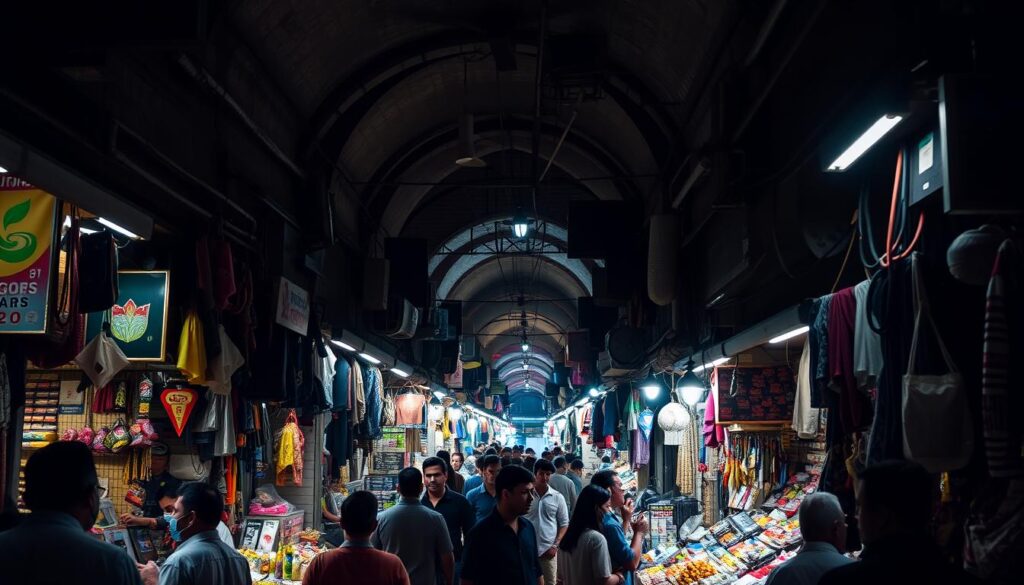The underground economy is a world hidden from the law. It includes both bad stuff like illegal goods and good stuff like secret jobs. This hidden world affects our regular economy a lot.
It gives us things we need but often keeps it a secret. Let’s dive into this hidden world together. We’ll see how it changes our economy and our lives.
Key Takeaways
The underground economy includes both unregulated and illicit activities.
It affects various sectors, providing essential services and goods in communities.
This hidden economy often operates without oversight, leading to both benefits and challenges.
Understanding the informal economy is vital for grasping its impact on traditional markets.
The shadow economy thrives on societal acceptance despite its legal ambiguities.
What is the Underground Economy?
The underground economy is all about activities that governments don’t control. It includes the grey market, where legal goods are traded in ways that break rules. It also includes the shadow economy, which is often illegal. Knowing about these helps us understand the informal economy better.
Definition and Overview
The underground economy is about deals that aren’t reported for taxes or rules. People and businesses do this to avoid taxes or to get around hard rules. It can be legal but not reported, or it can be illegal. This affects the market, economy, and our money.
Historical Context
The underground economy has been around for a long time. It’s been shaped by government policies and social changes. For example, the Prohibition in the U.S. made alcohol sales go underground. This shows how big events and economic needs lead to more underground markets.

| Aspect | Underground Economy | Formal Economy |
|---|---|---|
| Regulation | Minimal or none | Heavily regulated |
| Tax Reporting | Not reported | Reported and enforced |
| Types of Transactions | Both legal and illegal | Legal only |
| Economic Impact | Can destabilize markets | Structured economic growth |
The Importance of the Underground Economy
The underground economy is key in shaping our world. It shows how big parts of GDP come from hidden activities. It also helps groups left behind by society, giving them what they need.
Economic Impact
In many places, the underground economy is a big deal. It’s thought to be 10-20% of GDP. It offers jobs and services that are not seen by the official market. Small businesses without rules can grow, helping local areas but also facing big businesses.
Societal Influence
The underground economy does more than just numbers. It helps with housing, jobs, and goods, mainly for those who need it most. People use these systems to survive, changing how we see culture and society. It also makes us think about what is right and wrong, making it hard to decide what to do about it.

| Aspect | Economic Impact | Societal Influence |
|---|---|---|
| Contribution to GDP | 10-20% | Access to goods and services |
| Job Opportunities | Essential for many | Support for marginalized communities |
| Market Dynamics | Challenges traditional businesses | Shifts cultural perceptions of legality |
Types of Underground Economy Activities
The shadow economy has many activities. Some are legal, and some are illegal. Knowing about these helps us understand the black market and its big impact on society and the economy.
Legal vs. Illegal Transactions
In the underground economy, there’s a range from legal to illegal. Legal things include unlicensed home repairs and freelance work done without records. On the other hand, illegal things like drug sales and human trafficking are common in the black market. It’s important to know the difference to understand the underground economy’s size and effect.
Common Examples
The illicit economy has many examples. Some include:
- Drug dealing
- Unregistered employment
- Smuggling of goods
- Sale of counterfeit products
These show the many reasons people join the shadow economy.
Service-Based vs. Goods-Based Economies
The underground economy can be split into service and goods sectors. Service activities are things like home repairs, tutoring, or personal training. They offer quick and possibly cheaper solutions for people. Goods activities involve selling homemade items or things from the black market. They meet the need for unique or affordable products.
| Type | Examples | Characteristics |
|---|---|---|
| Legal Activities | Freelance work, unlicensed repairs | Typically less regulated, but viable |
| Illegal Activities | Drug sales, human trafficking | High risk, often involves severe penalties |
| Service-Based | Tutoring, plumbing | Focuses on providing direct assistance |
| Goods-Based | Counterfeit goods, homemade crafts | Items sold outside traditional retail settings |
Reasons for Participation in the Underground Economy
Many people and businesses join the underground economy for good reasons. They want to avoid taxes, find jobs, and get cheaper things. This shadowy market offers them what they need.
Tax Evasion
Not paying taxes is a big reason for joining the underground economy. People want to keep more of their money. So, they hide their income from the government.
Job Opportunities
When jobs are hard to find, people turn to the underground economy. It offers work when there’s no other way to earn. It helps families survive.
Consumer Demand for Cheaper Alternatives
Expensive living costs make people look for cheaper things. The underground economy provides these at lower prices. It’s a hit with those who watch their budget.
Challenges and Risks of the Underground Economy
The underground economy has many challenges and risks. These affect both those involved and society. We need to look at legal issues and how people are treated unfairly.
Legal Consequences
Being part of the underground economy can cause big legal problems. People might get fines, face criminal charges, or even go to jail. This is because the police are working harder to stop illegal activities.
Exploitation and Ethical Issues
Workers in the underground economy often face unfair treatment. They have little protection and work in bad conditions for low pay. This raises big questions about fairness and the need for better treatment.
| Aspect | Legal Consequences | Exploitation Issues |
|---|---|---|
| Potential Fines | Can exceed thousands of dollars | N/A |
| Imprisonment | Possible sentences ranging from months to years | N/A |
| Worker Rights | N/A | Often nonexistent in informal sectors |
| Wage Fairness | N/A | Significantly lower wages compared to formal employment |
The Role of Technology in the Underground Economy
Technology is changing the underground economy fast. It’s seen in things like cryptocurrency and the dark web. These tools help people in this economy to do deals and find new chances.
Cryptocurrency and Dark Web Transactions
Digital money like Bitcoin and Ethereum has changed how deals are made. They offer privacy that regular money can’t. So, the dark web is a big place for buying and selling secret stuff.
How Technology Facilitates Underground Activities
New tech makes the underground economy easier to get into. Secret messaging apps let people talk without being caught. Mobile apps make paying for things easy, without needing banks. This shows how tech helps the underground world grow.
| Technology Type | Impact on Underground Economy |
|---|---|
| Cryptocurrency | Facilitates anonymous transactions, reducing detection risk. |
| Dark Web | Hosts marketplaces for illicit goods, enriching accessibility. |
| Encrypted Messaging | Allows secure communication, minimizing law enforcement intercepts. |
| Mobile Payments | Enables unbanked users to participate in underground transactions. |
Underground Economy in Different Cultures
The underground economy changes a lot because of different cultures and local ways. Every place has its own special view on informal economies. This shows how tradition, rules, and beliefs shape these economies.
Looking at these views helps us see the underground economy’s big role. It’s not just about money.
Global Perspectives on Informal Economies
Informal economies are key in many labor markets around the world. In places like India and Nigeria, they are often more important than formal jobs. People work informally because they need to or because it’s a good chance.
Cultural Attitudes Towards Informality
How people see the underground economy varies a lot. In some places, it’s seen as a way to be creative and help the community. But in others, it’s seen as wrong or shady.
| Country | View of Informal Economy | Common Activities |
|---|---|---|
| India | Entrepreneurial | Street vending, small workshops |
| Nigeria | Necessary | Artisanship, market trading |
| United States | Mixed | Gig work, freelance services |
| Brazil | Supportive | Informal housing constructions |
These examples show how different cultures affect the underground economy. Each country’s view leads to different rules and actions. This shapes the world of informal economies.
Government Response to the Underground Economy
Governments have big challenges when they try to deal with the underground economy. This hidden world often slips past regular rules. It’s key for governments to understand this part of the economy well.
Regulatory Challenges
The underground economy is hard to regulate. It’s tough for governments to know how big it is and what it does. They struggle to make rules that work for both the hidden and open parts of the economy.
This struggle can lead to problems. It makes it hard for governments to find the right balance. They don’t want to stop good businesses but also can’t let the hidden ones get too big.
Strategies for Integration
Some governments are trying new ways to bring the hidden economy into the open. They offer licenses and tax breaks to help. This way, they hope more people will join the formal economy.
By doing this, governments want to make the economy more united. They want to make sure everyone is playing by the same rules. This could make the economy more transparent and easier to manage.
Effects of the Underground Economy on Local Communities
The underground economy affects local communities in many ways. It brings both good and bad things. People can earn money in secret ways, but it also causes problems.
Economic Empowerment
Being part of the underground economy can help people financially. In poor areas, it fills job gaps. It lets people start their own businesses and be self-sufficient.
This helps communities a lot. It makes people strong and able to live better.
Social Consequences
But, the underground economy also has downsides. It can make people distrust each other more. This is because of the crime and corruption it brings.
It can make communities feel unsafe. It’s hard to find the right balance between the good and bad sides.
Case Studies of the Underground Economy
The underground economy has many examples. These show the ups and downs of informal entrepreneurs. They often find ways to succeed, even when it’s hard.
Success Stories of Informal Entrepreneurs
Many informal entrepreneurs have made it big. They use their skills and what’s needed locally. They also change fast to keep up with the market.
These stories inspire others to try new things. They show that you can succeed outside the usual ways.
Failures and Risks Encountered
The underground economy has its perks but also big risks. Entrepreneurs face ups and downs in the market. They also deal with legal problems.
It’s hard to grow a business here. Some fail because of these challenges. Every business faces risks, but informal ones have it tougher.
| Success Factors | Challenges |
|---|---|
| Innovation and Resilience | Market Volatility |
| Ability to Adapt to Change | Legal Issues |
| Local Demand Recognition | Scaling Operations Difficulties |
| Cost-Effective Solutions | Lack of Support Networks |
Future Trends in the Underground Economy
The underground economy is changing fast. New tech, changing social views, and global shifts are shaping its future. These changes could make it work in new ways.
Predicting Changes in the Landscape
New digital money and how people shop will change the underground economy a lot. As tech gets better, hidden businesses might grow. The world getting smaller means more connections between secret deals.
This mix of factors suggests a future where hidden markets can adapt and survive.
Impact of Economic Policies
Rules on taxes and jobs will shape the underground economy’s future. Governments are learning to handle new economic situations. Their new rules might push hidden businesses to join the open market or create new secret ways to work.
Knowing about these changes helps everyone deal with the underground economy better. It lets us see how these shifts affect not just hidden markets but the whole economy.
| Factors Influencing Change | Future Trends | Potential Impact |
|---|---|---|
| Technology Advancements | Increased use of digital transactions | Greater anonymity and accessibility |
| Consumer Behavior | Demand for alternative products | Growth of informal markets |
| Globalization | Interconnected underground networks | Expanded international trade |
| Economic Policies | Stricter regulations | Potential rise of new underground activities |
Conclusion
The underground economy is a complex mix of legal and illegal activities. It shows how people meet their needs and reflects what society values. We’ve learned a lot about how it works and its big impact on communities and the economy.
Looking into why people join, how tech changes things, and cultural views helps us understand it better. This knowledge helps us see how the underground economy works.
As we look ahead, we must understand the underground economy’s complexities. It offers jobs but also brings challenges to society and government rules. Talking about these issues helps us deal with the underground economy’s effects on our world.
Knowing more about the underground economy leads to smarter talks and choices. By seeing its role and how different things affect it, we learn a lot. This knowledge is important for both people and the economy.
